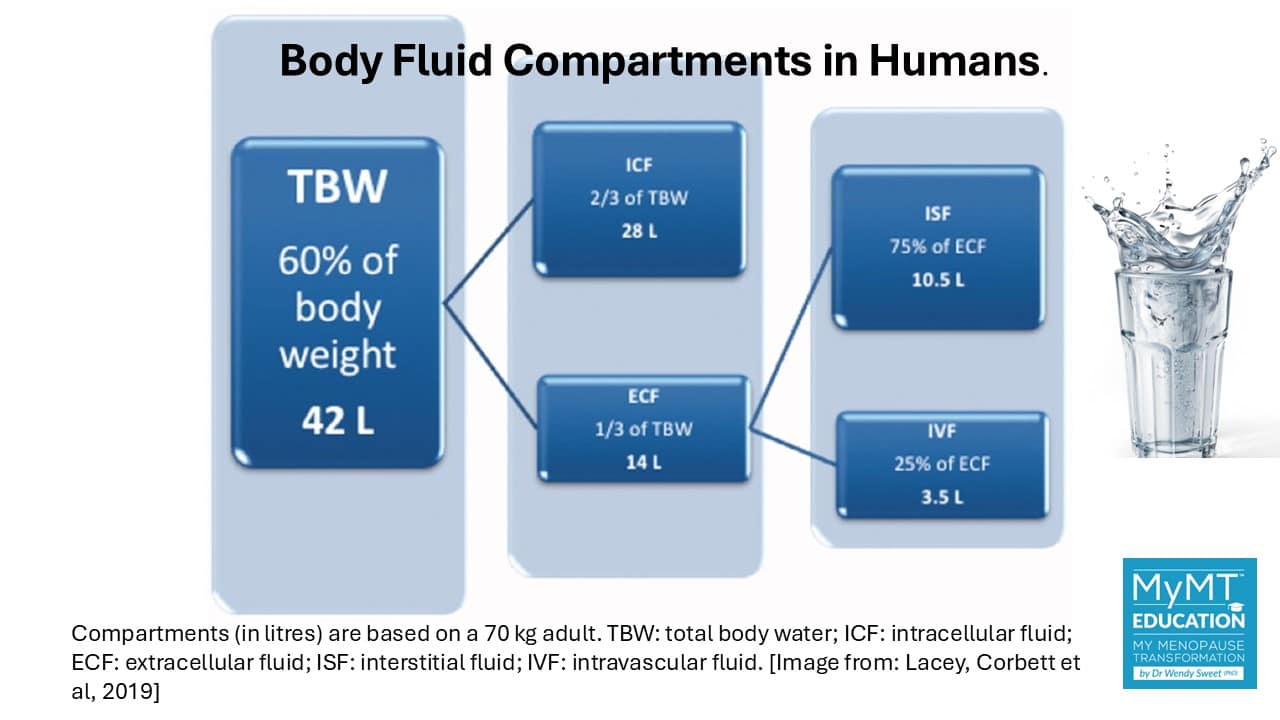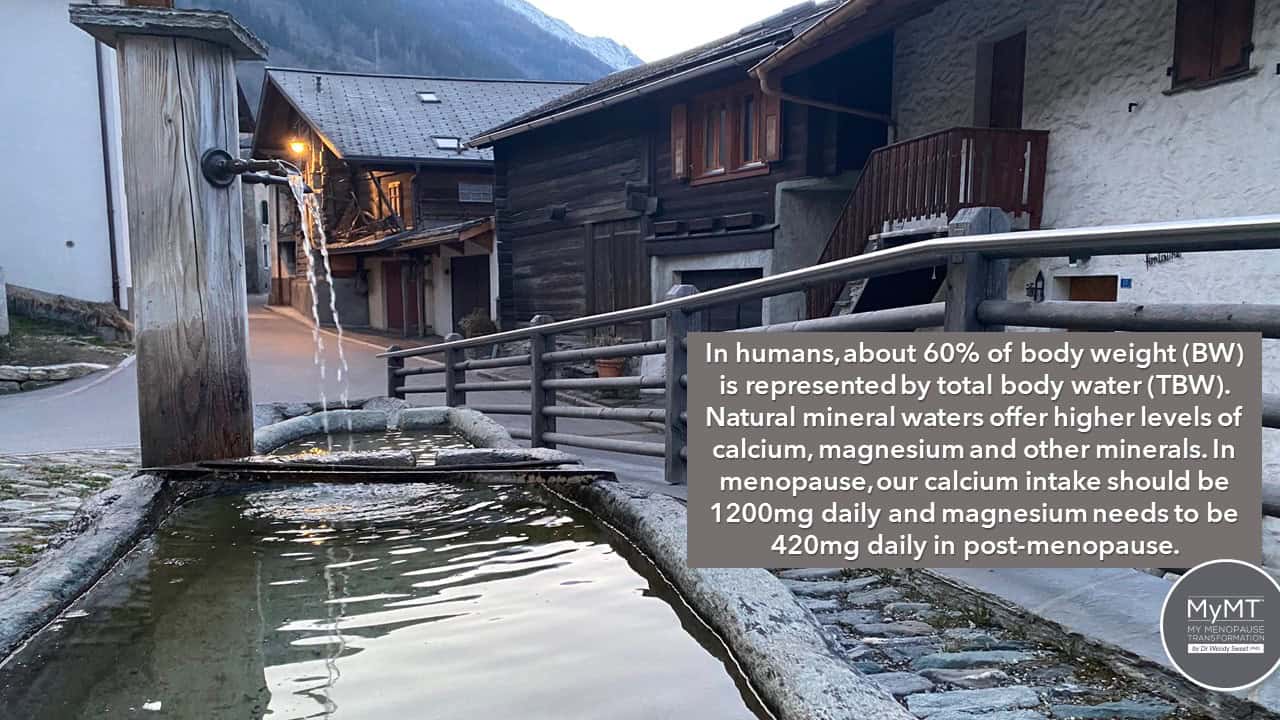When you walk around the lake-front of the small town where I live, there is a natural spring.
I became interested in it when I went into menopause. Not because of its aesthetic value, but because it reminded me of the small mountain village in Switzerland, which is home to a source of glacial water that runs down off the towering mountains above and into the troughs in the village.
In previous visits to this alpine village, I thought that the troughs were for animals, but they aren’t. The locals drink this water and according to the World Health Organisation, this village has pristine water that is ranked high in it’s calcium and magnesium content.
Yes indeed, 1 litre of this water running off the Swiss Alps, delivers around 520mg of calcium per litre. That’s half of your client’s total calcium intake of 1200mg per day. Drink 2 litres daily and there is their calcium intake done and dusted without a calcium supplement in sight.
With the winter cold here in the south of New Zealand where I live, it’s a time when women are reluctant to drink water. But if your clients want to reduce their brain-fog, anxiety, depression, hot flushes/ flashes and improve their muscle recovery and their gut health as they move through menopause, then I want you, as their Coach/ Practitioner, to remind them why.
And this isn’t just because of the natural minerals that they can attain from a good source of spring water, but also because newer research suggests that water is one of the most beneficial nutrients for their changing gut health in menopause.

A multidisciplinary consensus on dehydration in 2019 has opened up the discussion about water intake and levels of dehydration in humans – especially now, that there is greater concern about heat intolerance in many countries as climate change arrives.
The direct measurement of plasma osmolarity (pOsm) is the gold standard for determining dehydration and “Dehydration” is a term which, in clinical use, refers to a deficiency in total body water. But this is hard to define as well as to manage in clinical settings, mentions the report. [Lacey, Corbett et al, 2019].
We all know that water intake is essential for survival.
But what does water intake mean to your clients? How much water do they drink in a day? Do you know? Perhaps they are busy drinking other fluids instead of water, without understanding the impact of these on their symptoms?
The functions of water are needed for the management of all menopause symptoms. This includes your client’s metabolism, modulation of normal osmotic pressure, which helps their blood pressure, maintenance of their electrolyte balance, and regulation of body temperature. It is also needed to help reduce brain fog and improve mood.
The brain regulates cognitive performance and mood, and water accounts for approximately 75% of brain mass. [Zhang et al, 2019].
Newer research also suggests it is important for your client’s gut health too.
Whilst we all know that we should be drinking enough water to remain cool (around 2L daily), did you know that the type and quality of water also affects the gut microbiome of your midlife and older clients’ as well?
No, nor did I.

Effects of Water Intake on the Gut Microbiome
The effect of drinking water on the gut microbiome is poorly understood mentions a study exploring the associations of plain drinking water source and intake with gut and oral microbiota compositions in a population-based cohort. (Vanhaecke, Britten et al, 2022).
Factors such as lifestyle and diet are now widely recognized as key drivers of gut and oral microbiome compositions, so it was interesting that this new study was one of the first times that water quality, amount and type had been positioned in gut health research and microbiota composition.
The researchers set out to explore plain drinking water source and intake with the composition of the gut and oral microbiota in a large cohort of self-selected participants, some from the US Gut Health Project and others from the United Kingdom.
Water is the main component of the body and represents approximately 76% of muscle mass, so for women entering menopause and for those of your clients in post-menopause, their water intake and quality matters to their ongoing health and symptoms.
We all know that drinking water comes from various origins – albeit these days, primarily via plastic bottles or boxes purchased at the supermarket! But what type of water (tap-water, well-water, filtered water or bottled water) is best for our gut microbiota? This is what this study attempted to explore.
Tap water is obviously subjected to different treatments before its consumption.
Whereas natural mineral water, spring water, and well water, such as in the village where I live and in the Swiss mountain village where I visit occasionally, comes from groundwater, tap water originates either from surface water or from groundwater, but undergoes various treatments depending on government and community requirements and regulations.
Common treatments control the chemical and mineral composition in tap water.
As the authors mentioned, “consumed in large amounts on a daily basis, drinking water may be considered a potential source of microbial gut diversity” (p. 172).
And for women going into and through menopause, their gut diversity matters, because the health of the gut and the gut microbiome influences sleep, temperature regulation, brain fog, anxiety and depression – all symptoms which frustrate numerous women during their menopause transition.

Whilst this new research focused on both men and women, 56% of subjects who qualified for the study were mid-life women.
That’s what piqued my interest in it as well as the fact that this study was perhaps the first to specifically explore the links between drinking water consumption, in terms of both origin and amount consumed, and the microbiota of the digestive tract independently of a wide range of confounding factors (demographics, lifestyle, and diet) in a large sample of the general population.
So, what did the study find?
- Drinking water source was among the major contributing factors to the variation in gut microbiota composition.
- Subjects drinking mostly well water had higher microbiota and diversity than the groups drinking either bottled, tap, or filtered water. This higher diversity is beneficial to gut health.
- The amount of water drunk was also associated with differences in gut microbiota composition between participants who consumed low and high amounts of drinking water. Participants who ranked as low water drinkers (less than 1L daily) were found to have poorer gut microbiome diversity.
Lower gut bacterial diversity, has consistently been associated with impaired gut health and lifestyle diseases. When the gut microbial community has greater diversity, the immune system may be more resilient and robust against environmental influences.
Hence, higher diversity appears a hallmark of healthy gut microbiomes and the researchers concluded that yes indeed, where we source our water from and how much we drink may be an important influence on gut health, which in turn affects the mental health, brain-fog and cognition of women in menopause, via the gut-brain axis.

With many women I come across in my own programmes, telling me that they have expereinced long covid symptoms, which interestingly, have similarities to menopause symptoms, it’s important to also check this with your clients and move them to a Gut Health Specialist, if this is not in your Scope of Practice.
A growing body of evidence has also implicated the gut microbiome—the trillions of bacteria, fungi, and other microbes that inhabit the digestive tract—in both covid severity and long covid recovery. [BMJ, 25/01/2022]
Long COVID has emerged as affecting the health of people through changes to their microbiota as the microbiota is now known to modulate the innate and adaptive immune responses. [Álvarez-Santacruz et al., 2024].
So, whether you are in the heat of the northern hemisphere or in the cold of the Southern Hemisphere, this article is your reminder that in order to help your client’s menopause symptoms and their changing gut health, one of your coaching goals is to discuss their water intake with them – and according to this research, preferably water sourced underground from a well.
If you haven’t explored the MyMT™ Education courses which focus you on women in their menopause transition, I hope you can visit the Education page of the My Menopause Transformation website. For those of you interested in the 12 week Practitioner course, then my video about this is below.
You can also get in touch with the Course Convenor, Georgia, on georgia@mymenopausetransformation.com. She has the answers to your questions about the courses.
Dr Wendy Sweet (PhD)/ MyMT™ Founder/ Member: Australasian Society of Lifestyle Medicine.
References:
Álvarez-Santacruz C, Tyrkalska SD, Candel S. The Microbiota in Long COVID. Int J Mol Sci. 2024 Jan 22;25(2):1330. doi: 10.3390/ijms25021330.
Krause EG, de Kloet AD, Flak JN, Smeltzer MD, Solomon MB, Evanson NK, Woods SC, Sakai RR, Herman JP. Hydration state controls stress responsiveness and social behavior. J Neurosci. 2011 Apr 6;31(14):5470-6.
Lacey J, Corbett J, Forni L, Hooper L, Hughes F, Minto G, Moss C, Price S, Whyte G, Woodcock T, Mythen M, Montgomery H. A multidisciplinary consensus on dehydration: definitions, diagnostic methods and clinical implications. Ann Med. 2019 May-Jun;51(3-4):232-251. doi: 10.1080/07853890.2019.1628352.
Vanhaecke, T., Bretin, O., Poirel, M. & Tap, J. (2022). Drinking Water Source and Intake Are Associated with Distinct Gut Microbiota Signatures in US and UK Populations, The Journal of Nutrition, Volume 152, Issue 1, January 2022, Pages 171–182.

